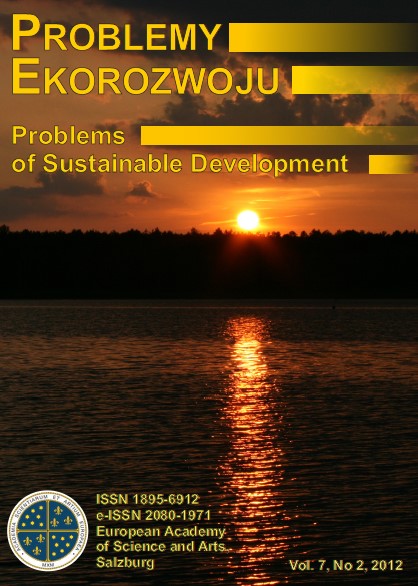Sustainable Development: the Upcoming Civilizational Revolution?
Article Sidebar
Issue Vol. 7 No. 2 (2012)
-
Information: Impact Factor
Lucjan Pawłowski5
-
Do the Liberal Capitalism and Globalization Enable the Implementation of Sustainable Development Strategy?
Lucjan Pawłowski7-13
-
Energy Production from Maize
David Piementel15-22
-
Revealing the Level of Tension Between Cultural Heritage and Development in World Heritage Cities
Molly Turner, Ana Pereira Roders, Marc Patry23-31
-
Low Carbon Development of China’s Yangtze River Delta Region
Shengdao Shan, Xiaohang Bi33-41
-
Sustainable Development: the Upcoming Civilizational Revolution?
Ignacy S. Fiut43-50
-
Social Policy in the European Sustainable Development Strategy
Aleksandra Ciżmowska51-59
-
Does the Evangelical Understanding of the Concept of Property Serve Sustainable Development?
Karolina Szulc61-65
-
Man and Nature. A New Project on New Spirituality
Zbigniew Pasek, Agnieszka Dyczewska67-76
-
Selecting Sustainability Indicators for Local Community – Case Study of Milanówek Municipality, Poland
Justyna Gutowska, Jerzy Śleszyński, Małgorzata Grodzińska-Jurczak77-86
-
Polish Planners’ Attitudes Towards Citizen Participation
Łukasz Damurski87-96
-
Ecosystem Services in the Light of a Sustainable Knowledge-based Economy
Artur Michałowski97-106
-
Eco-management in Polish Companies
Ewa Bojar, Matylda Bojar, Anna Żelazna-Blicharz, Piotr Blicharz107-113
-
Letter to the Editorial Office: Time for the Intellect to Take Over From Mind
G Venkatesh115-117
Archives
-
Vol. 9 No. 2
2014-07-01 16
-
Vol. 9 No. 1
2014-01-02 19
-
Vol. 8 No. 2
2013-07-01 13
-
Vol. 8 No. 1
2013-01-02 12
-
Vol. 7 No. 2
2012-07-02 14
-
Vol. 7 No. 1
2012-01-02 12
-
Vol. 6 No. 2
2011-07-01 19
-
Vol. 6 No. 1
2011-01-03 18
-
Vol. 5 No. 2
2010-07-01 21
-
Vol. 5 No. 1
2010-01-04 16
Main Article Content
Authors
Abstract
In this work the concept of sustainable development is presented as the currently most important revolutionary project in our civilisation, which should rapidly change the way people think and act globally. The aim of this revolution should be the distancing from, or the overcoming of difficulties which beset the modern world, resulting from the growing disharmony and ecological imbalance between the global community and our planet’s entire natural environment.
The basis for the analysis is Artur Pawłowski’s book entitled Sustainable Development as a Civilizational Revolution. A Multidisciplinary Approach to the Challenges of the 21st Century. The author presents multilateral arguments for the necessity of such a global revolution related to civilisation. This idea is discussed and compared with other views on the world’s future and the possibility of realising within it the concept of sustainable development in terms of business, economic, political, social and awareness activities.
Pawłowski’s view has been categorised as a form of hypothetical rationalism and realism, and continues the Polish traditional way of thinking in this field. In modern analysis, the author’s view on the possibility of realising sustainable development can be placed between Klaus Bosselmann’s optimism and Christian de Duve’s pessimism.
Keywords:
References
BOSSELMANN K., The Principle of Sustainability: Transforming Law and Governance, Ashgate Publishing, Burlington 2008.
BOSSELMANN K., TAYLOR P., 2009, The Significance of Earth Charte in International Law, in: The Way Forward, p. 173-174.
BOSSELMAN K., 2010, Sustainability and Courts: Journey Yet to Begin?, in: Journal of Court Innovation 3:1, p. 337-347.
CROSBY A. W., Imperializm ekologiczny. Biologiczna ekspansja Europy 900-1900, PIW, Warsaw 1999.
DE DUVE CH., Genetics of original sin, Yale University Press, Yale 2010.
DE KERCKOHOVE D., (2009), Przyszłość 2030, in:, Kody McLuhana. Topografia nowych mediów, eds. A. Maj, M. Derda-Nowakowski, D. de Kerckhove, Katowice, p. 83-84.
FIUT I.S., EKOetyki. Kierunki rozwoju aksjologii współczesnej przyjaznej środowisku, Oficyna Wydawnicza Abrys, Kraków 1999.
FIUT I.S., Ekofilozofia. Geneza i problemy, Wydawnictwo STAL, Cracow 2003.
FIUT I.S., 2011, O znaczeniu sztuki (dzieła sztuki) we współczesnych modelach komunikowania, in: Estetyka i Krytyka, nr 20(1), p. 65-86.
GODDEN L., 2009, The Principle of Sustainability: Transforming Law and Governance, by Klaus Booselmann, in: Osgoode Hall Law Journal , nr 47, p. 807-816.
HARDIN G., 1968, The Tragedy of the Commons, un: Science, vol. 162, no 3859, p. 1244-1248.
HARDIN G., 1998, Extensions of “The Tragedy of the Commons”, in: Science, vol. 280, no 5364, p. 682-683.
IKERD I., 2008, Sustainable Capitalism: A Matter of Ethics and Morality, Problemy Ekorozwoju/Problems of Sustainable Development, vol. 3, no 1, p. 13-22.
PAPUZIŃSKI A., 2011, Realizacja zrównoważonego rozwoju/The Implementation of Sustainable Development, Problemy Ekorozwoju/Problems of Sustainable Development, vol. 6, no 1, p. 107-116.
PAWŁOWSKI A., Odpowiedzialność człowieka za przyrodę, Wydawnictwo Politechniki Lubelskiej, Lublin 1999.
PAWŁOWSKI A., DUDZIŃSKA M. R. (eds.), Zrównoważony rozwój w polityce i badaniach naukowych, Zeszyty Naukowe Politechniki Lubelskiej, Wydawnictwo-Drukarnia ‘Libera’, Lublin 2001.
PAWŁOWSKI A., 2008, The Role of Social Science and Philosophy i Shaping of the Sustainable Development Concept, in: Problemy Ekorozwoju/Problems of Sustainable Development, vol. 3, no 1, p. 7-11.
PAWŁOWSKI A., Rozwój zrównoważony – idee, filozofia, praktyka, Monografie Komitetu Inżynierii Środowiskowej PAN, vol. 51, KIŚ, Lublin 2008.
PAWŁOWSKI A., Sustainabble Development as a Civilizational Revolution. Multidisciplinary Approach to the Challenges of the 21st Century, CRS/Balkema, London 2011.
PIĄTEK Z., Etyka środowiskowa. Nowe spojrzenie na miejsce człowieka w przyrodzie, Księgarnia Akademicka, Kraków 1998.
PIĄTEK Z., Ekofilozofia, Wydawnictwo Uniwersytetu Jagiellońskiego, Kraków 2008.
PIĄTEK Z., 2011, Czy społeczeństwo „opętane ekologią” stanowi zagrożenie ludzkiej wolności i demokracji?/Socjety „Possessed by Ecology” is it a Threat to Human Freedom and Demoracy?, in: Problemy Ekorozwoju/ Problems of Sustainable Development, vol. 6, no 1, p. 83-94.
SZTUMSKI W., Quo ruis, homo? Środowisko życia, czas, ludzie, „Śląsk” Sp. z o. o. Wydawnictwo Naukowe, Katowice 2008.
WEISS M., Etyka a ewolucja. Metaetyczny kontekst etyki ewolucyjnej, Wydawnictwo Poznańskie, Poznań 2010.
Article Details
Abstract views: 64
License

This work is licensed under a Creative Commons Attribution-ShareAlike 4.0 International License.


